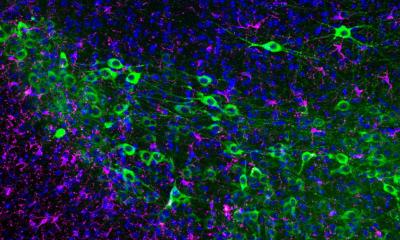News • Neurodegenerative disease
Low magnesium-levels raise risk of dementia - but so do high ones
People with both high and low levels of magnesium in their blood may have a greater risk of developing dementia, according to a study published in Neurology, the medical journal of the American Academy of Neurology.
“These results need to be confirmed with additional studies, but the results are intriguing,” said study author Brenda C.T. Kieboom, MD, MSc, of Erasmus University Medical Center in Rotterdam, the Netherlands. “Since the current treatment and prevention options for dementia are limited, we urgently need to identify new risk factors for dementia that could potentially be adjusted. If people could reduce their risk for dementia through diet or supplements, that could be very beneficial.”
The study involved 9,569 people with an average age of 65 who did not have dementia whose blood was tested for magnesium levels. The participants were followed for an average of eight years. During that time, 823 people were diagnosed with dementia. Of those, 662 people had Alzheimer’s disease. The participants were divided into five groups based on their magnesium levels. Both those with the highest and the lowest levels of magnesium had an increased risk of dementia, compared to those in the middle group.

Both the low and high groups were about 30 percent more likely to develop dementia than those in the middle group. Of the 1,771 people in the low magnesium group, 160 people developed dementia, which is a rate of 10.2 per 1,000 person-years. For the high magnesium group, 179 of the 1,748 people developed dementia, for a rate of 11.4 per 1,000 person-years. For the middle group, 102 of the 1,387 people developed dementia, for a rate of 7.8. The results were the same after researchers adjusted for other factors that could affect the risk of dementia and magnesium levels, such as body mass index, smoking status, alcohol use and kidney function.
Kieboom noted that almost all of the participants had magnesium levels in the normal range, with only 108 people with levels below normal and two people with levels above normal. Foods that are good sources of magnesium include spinach, almonds, cashews, soy and black beans, whole grains, yogurt and avocados.
Kieboom said that if the results are confirmed, blood tests to measure magnesium levels could be used to screen for people at risk of dementia. She emphasized that the study does not prove that high or low levels of magnesium cause dementia; it only shows an association. Limitations of the study include that magnesium levels were measured only once, so they could have changed, and that magnesium levels in the blood do not always represent the total level of magnesium in the body.
Source: American Academy of Neurology (AAN)
24.09.2017





